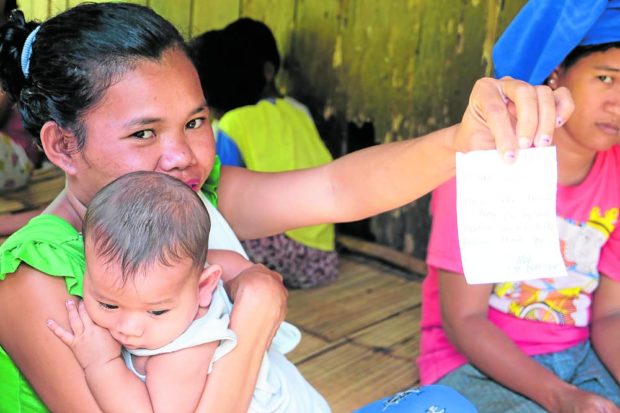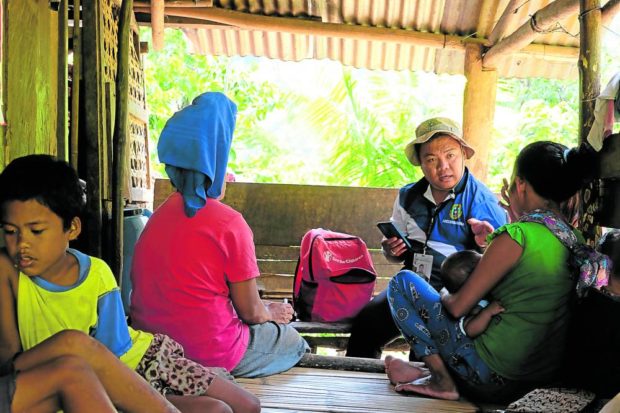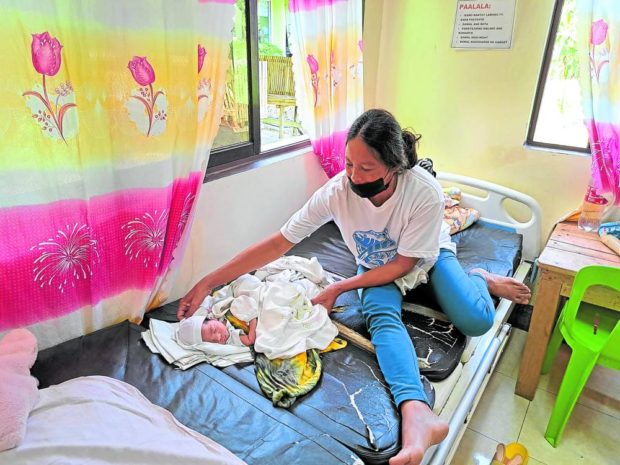For T’boli mothers, ‘paltera’ now belongs to the past

OUTREACH | Crisana Lambay, a resident of remote Bati-an village in Maitum, Sarangani, shows off the handwritten note of local government midwife John Mark Odani for her request to have an Implanon insertion, a birth control method. (Photo by BONG S. SARMIENTO / Inquirer Mindanao)
MAITUM, Sarangani, Philippines — John Mark Odani, who comes from a poor Ilocano family in this town, is making natal care services easily available to pregnant women and newborns in far-flung T’boli tribal communities here, weaning them away from traditional birthing practices which are often dangerous to both mother and child.
T’boli mothers in this rustic town of some 50,000 people usually seek the assistance of a “paltera,” or a woman who is informally trained to assist in delivering a baby, also called “hilot,” or “fesut nga.”
And absent prenatal examinations, they have no idea about their expected time to deliver a baby, save when they already experience labor pains.
But not for Mary Grace Manuel’s delivery of her first child 10 years ago in the dead of the night in their nipa hut in remote Barangay Bati-an.
“We were surprised to know that the baby already came out,” Simeon Cabulat, Manuel’s grandfather, said in the vernacular.
Article continues after this advertisementThe cry of the newborn and the call for help from Manuel, who has a speech problem, awakened the household.
Article continues after this advertisementSeeing the newborn’s umbilical cord was still connected to her mother’s placenta, Cabulat — who was born with the help of a hilot along with his nine other siblings — cut it off with his sharp knife without any hesitation.

Odani had to cross the Kalaong River to reach the far-flung communities of Bati-an. (Photo by BONG S. SARMIENTO / Inquirer Mindanao)
Isolated
The next morning, family members brought Manuel and the baby to the rural health unit (RHU) at the población (town center) to avail of proper maternal and child care services.
Populated by the T’boli tribe, Bati-an is one of the poorest villages of Maitum, mainly because it is the farthest and most isolated. In getting to the town center, one had to negotiate a rough road, brave the currents of a river and after crossing, spend P100 for a “habal-habal” (motorcycle for hire) ride.
Add to this the lack of assigned health personnel, it is not surprising that pregnant women had nil access to prenatal and maternal and childcare services.
Things began to change when Odani was deployed there, first as a health volunteer some 10 years ago.
At that time, no one wanted to accept an assignment there due to the transport difficulties. Bati-an has six subvillages spread far between mountains.
“Sa sobrang layo, napaiyak ako noon (I shed tears then because it’s very far),” recalled Odani, who just earned a two-year nursing aide course then.
But he persevered and began to love his work. He regularly visited Sitio Angko, the farthest subvillage to render immunization, pre and postnatal care and family planning services.
After some time, Odani obtained a scholarship from the Sarangani provincial government to study midwifery and became a licensed midwife in 2015. He returned to Maitum and asked to be assigned back to Bati-an, where he learned to speak the T’boli language.
From a contractual employee, Odani got a permanent post in September 2020, cementing his fate with Bati-an.
Since then, Odani could no longer count how many children he had delivered. At times, he would be asked to circumcise young boys borne by the women of Bati-an.

PEP TALK | Maitum midwife John Mark Odani interacts with housewives of Bati-an’s Sitio Blete in Maitum. (Photo by BONG S. SARMIENTO / Inquirer Mindanao)
Recognition
But aside from delivering babies, he also conducts immunization, does checkups for ordinary illnesses, leads a campaign against open defecation and unsanitary practices and promotes environmental awareness.
Fondly called Marky, the openly gay Odani has a way with the socially conservative T’boli tribe members, especially with the mothers who listen to his maternity health advice and who feel comfortable with him delivering their babies.
For his work with the T’boli tribe, he was conferred the 14th Gawad Geny Lopez Bayaning Kabataang Pilipino Award in 2017.
Odani said he did not expect the award but expressed his gratitude for the recognition.
“When you love your job, you will enjoy it—and that is what matters the most,” the 31-year-old midwife stressed.
Today, Maitum’s 19 villages have assigned nurses and midwives, thanks to the Human Resources for Health program of the Department of Health (DOH). Of the nurses, one is funded by the local government while the rest by the DOH.
However, only seven of the 19 midwives are regular employees of the municipal health office because of the local government’s limited resources, said Dr. Marilyn Silauso, acting municipal health officer.
The RHU also does not accept patients for admission due to lack of rooms. Instead, it refers patients to the nearby hospital owned and operated by the Sarangani provincial government.
“Aside from medical check-ups and dental service, RHU Maitum has laboratory facilities that can be availed for free by our clients,” Silauso said.

Analita Dingly attends to her newborn baby boy, her sixth child. Odani had convinced Dingly to ditch the services of a “paltera” during delivery in favor of the safe and convenient birthing facility in Barangay Upo. (Photo by BONG S. SARMIENTO / Inquirer Mindanao)
Community presence
Odani regularly goes to his assigned area at least once a week. His backpack always contains medicines for ordinary illnesses in case villagers would ask for these.
Because of his steady presence in Bati-an, paltera are becoming a thing of the past for the T’boli tribe.
“The pregnant mothers would (now) go to our birthing centers on their expected due dates,” Odani said.
For maternity services, Maitum town operates three birthing facilities—at población and in the villages of Upo and Maguling. Members of the state-run Philippine Health Insurance Corp. or indigent patients could give birth for free in these facilities.
Analita Dingly, 39, gave birth to a healthy baby boy around 6:05 p.m. on Sept. 1, her sixth. She delivered her first three children at their home with the help of a paltera, which she paid P500 for her service.
But now, Dingly realizes that delivering at the birthing facility is convenient and safer both for her and her baby.
“There’s a midwife and a nurse making sure that we’re in good condition. My recovery here is fast because of the medication,” she said.
Dingly only shelled out P50 for the processing of the birth certificate.
On family planning, midwife Odani often emphasizes to parents to space giving birth, and try to have fewer children so they can effectively address their family needs with the resources that they have.
“Considering that many of the T’bolis are poor, they will have more difficulty addressing the family’s needs if they have more children,” he said.
Crisana Lambay, 29, a wife of a farmer, was chanced upon heeding the advice of Odani. She just gave birth five months ago to her third child, a boy. Her two other children are age 6 and 2.
Odani handed her a note, asking the maternity facility to accommodate her request for Implanon insertion, a birth control method that could last for three years.
“It’s difficult to have many children. We are practicing birth control so that our eldest child can go to school,” said Lambay, cradling her baby.
For members of the T’boli tribe in Barangay Bati-an, the regular presence of midwife Odani in their midst is a big relief.
“We can feel the presence of the government with his presence in our community. We are thankful for his work and dedication even if we are far from the town center,” Cabulat said.
RELATED STORIES
How first-time mothers are giving birth, rearing babies in the new normal